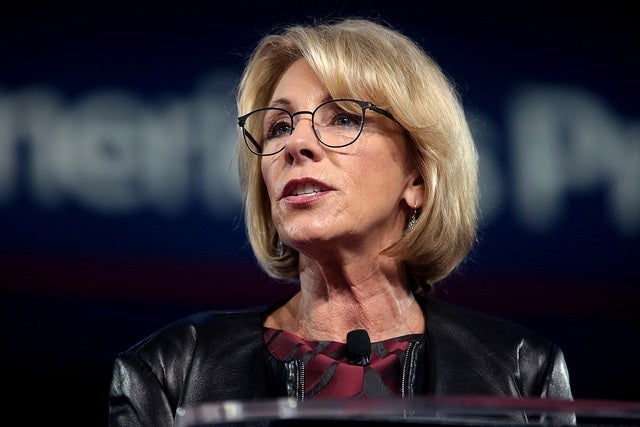Via Legal Reader
By: Ryan Farrick
The lawsuit accuses DeVos and her Department of Education of intentionally and illegally ignoring tens of thousands of loan forgiveness applications.
Education Secretary Betsy DeVos is being sued by defrauded student loan borrowers who claim the federal government isn’t taking their forgiveness applications seriously.
CNN reports that more than 150,000 such applications are still pending. Some student loan borrowers have waited years for debt relief, with no end in sight.
So, on Tuesday, seven debtors opted to file suit against the Department of Education. All of them attended for-profit colleges, some of which charged tremendous amounts of money for sub-par educations and self-accredited degree programs.
“Department officials have not offered a timetable for reviewing these applications. It’s becoming very clear that they’re not treating them in good faith,” said Eileen Connor, legal director of the Harvard-affiliated Project on Predatory Student Lending.
The PPSL, adds CNN, filed the lawsuit on behalf of the seven borrowers.
The Education Department purportedly stopped processing applications under orders from DeVos.
DeVos—an outspoken proponent of for-profit colleges—has been rewriting and trying to reconfigure Obama-era regulations since she took office. She’s already succeeded in loosening some restrictions on private schools, including rescinding a requirement that for-profit institutes publish figures showing the average salaries and career outcomes of graduates.
So far, the courts have sided with plaintiffs. In October, a federal judge—responding to a lawsuit backed by 19 attorneys general—blasted DeVos’s application freeze as “arbitrary and capricious.”
That judge ordered the Education Department to resume processing forgiveness applications. But the agency didn’t budge—CNN says data indicates that no claims were reviewed or approved through the end of last year.
Furthermore, Connor claims there’s no reason to believe that the department made substantial progress this year, either.
Toby Merrill, the PPSL’s director, suggested the delays may be illegal.
“The law is clear: Students who experienced fraud should not be required to pay back federal loans that should never have been made by the Department in the first place,” Merrill said.
CNBC spoke to one victim of fraud, Brandon Schultz.
In 2008, Schultz decided to begin taking classes for a graphic design degree. He enrolled in an online program at the Art Institute of Pittsburg, a for-profit school that’s been the source of many ‘borrower defense’ forgiveness applications.
“I wanted to get into a field I enjoyed,” Schultz told CNBC. “The Art Institute of Pittsburgh, it sounded fancy.”
But Schultz found the classes were mediocre and low-quality—instruction seminars on how to use basic classes, rather than an in-depth exploration of graphic design.
After graduating, Schultz couldn’t find a job. His education and his degree didn’t prepare him for the kinds of common tests design firms give prospective employees.
However, he still owed nearly $100,000 to the Art Institute—and he’s struggled repaying that on a far smaller salary than he’d hoped to get.
Schultz filed a forgiveness application in 2015, but the Department of Education has yet to make a decision.
“It’s scary,” Schultz said. “All I can do is wait for the government to give me some type of judgment.”
Filed in: In the News
Contact Office of Clinical and Pro Bono Programs
Website:
hls.harvard.edu/clinics
Email:
clinical@law.harvard.edu
